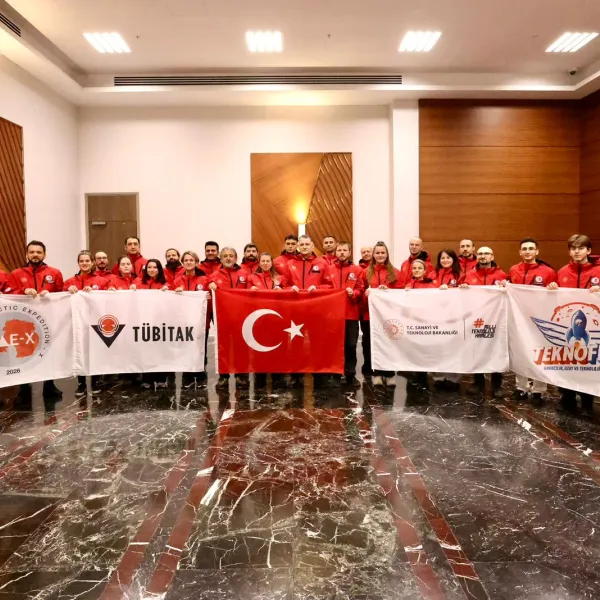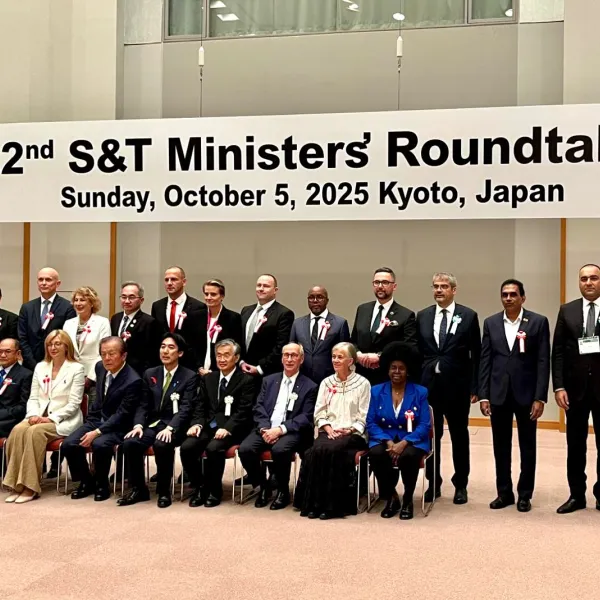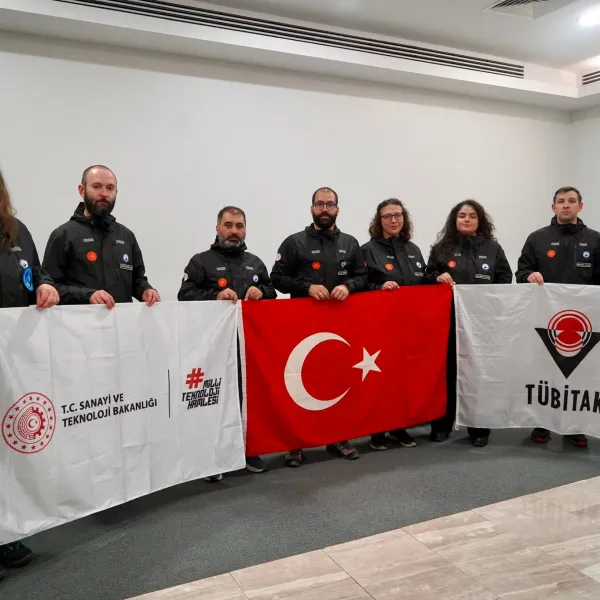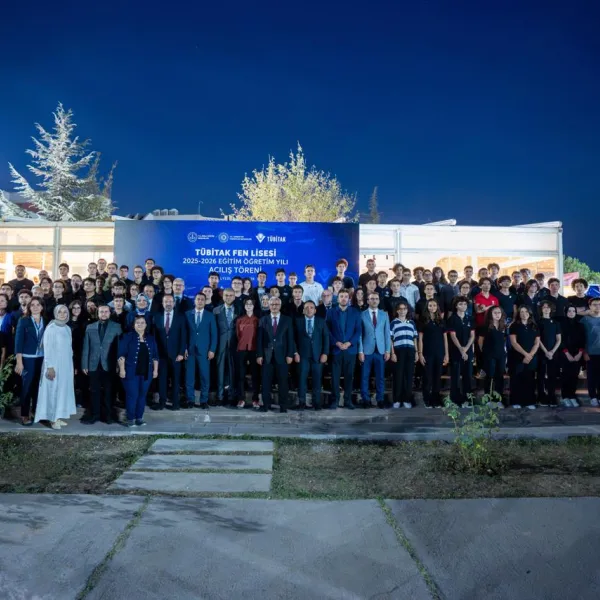
On February 6, 2023, not only 11 provinces but also the whole of Türkiye were deeply shaken by successive earthquakes centered in Kahramanmaraş. Our state mobilized all its institutions in the search and rescue and relief efforts that started immediately after the earthquake. During this period, we, as TÜBİTAK, contributed to the process with our volunteers working in the region, with our technologies that can be quickly adapted to urgent needs, and with research programs to analyze the disaster, while we designed and implemented new support mechanisms in line with the needs in the Disaster Region with our support for academia, industry, scientists, science and society. We provided science and society support to the earthquake region. We conducted earthquake-related research in our Centers and Institutes. We continue our earthquake-related studies.
What are we doing today?
TÜBİTAK President Prof. Dr. Hasan Mandal will attend the 2023 Kahramanmaraş-Türkiye Earthquakes International Commemoration Conference to be held in Adıyaman, where he is also a member of the organizing board, and will make a presentation. Researchers and scientists from both Türkiye and around the world will participate in the conference, which will start at 4:17 pm when the earthquake occurred and last until the evening. Both the past and the future will be discussed at the conference where the earthquake will be discussed in a multi-dimensional manner.
In addition to attending the conference, TÜBİTAK President Mandal will also make examinations in the region.
6 February We are organizing a Virtual Conference on Aftershock & Seismic Hazard Studies and Paleoseismology Research Platform in the Disaster Region
6 February Kahramanmaras Earthquakes, will organize a seminar on Earth Sciences Studies after the earthquakes. In the seminar, TÜBİTAK President Prof. Dr. Hasan Mandal will make an opening speech, Assoc. Prof. Dr. Ökmen Sümer from Dokuz Eylül University Department of Geological Engineering, Assoc. Prof. Dr. Mehmet Ergin from TÜBİTAK MAM Climate Change and Sustainability Vice Presidency, Earth Sciences Research Group and Aylin Karaaslan, Senior Engineer, will present earthquake studies under the moderation of Dr. Adil Tarancıoğlu.
In the seminar, information will be given about TÜBİTAK's important projects and studies, aftershock studies carried out after the Kahramanmaraş Earthquakes, the research platform for determining the paleoseismological characteristics of live faults in Türkiye, and earthquake hazard and risk assessment studies will be discussed in detail.
You can follow the February 6 Virtual Conference on Aftershock & Seismic Hazard Studies and Paleoseismology Research Platform in the Disaster Region on February 6, 2024 at 14.00 on TÜBİTAK YouTube channel.
Special Call titled "UDAP Disaster Risk Reduction Research" Opens Under ARDEB 1001 Program
Within the framework of the cooperation protocol signed between TÜBİTAK and AFAD, a call for "UDAP Disaster Risk Reduction Research" is opened within the scope of the "1001-Scientific and Technological Research Projects Support Program".
Within the scope of the call, project proposals to be submitted from the following Priority R&D and Innovation Topics will be supported:
1. Geodynamic Research and Widespread Socio-Economic, Social and Environmental Impacts of Earthquakes
2. Digital Technologies and Devices for Earthquakes
3. Earthquake-Resilient Construction Models and Waste Management
4. Scenario, Estimation and Analysis Studies for Earthquake Management
What did we do immediately after the earthquake?
Not only did we ensure that researchers were deployed to the earthquake zone within 24 hours to conduct research, but we also created new support programs to address the needs in the region.
TÜBİTAK 1002-C Natural Disasters Focused Fieldwork Emergency Support Program
Immediately after the earthquake, "TÜBİTAK Natural Disasters Focused Fieldwork Emergency Support Program" was launched with a proactive approach. The applications received under the program were evaluated and decided within 24 hours and the support process was initiated. Following the earthquake disaster, 124 applications were received from 61 different institutions covering topics such as collection of scientific data, seismic, geological, geodetic, tectonic, geotechnical, structural health and damage, transportation structures, sea level change, soil structure and liquefaction, surface fracture, landslides, radon gas output, agriculture, environment, historical and cultural structures, health services, psychology, social sciences, food safety, disaster management, etc., in line with the aim of ensuring preparedness for similar disasters. 577 scientists from all over Türkiye collected field data in fields ranging from geophysics to logistics.
BİÇABA
We opened the call for the We Will Work Together and Succeed Together Program (BİÇABA) to enable undergraduate, graduate and doctoral students and postdoctoral researchers affected by earthquakes to take part in research projects conducted or supported by TÜBİTAK. Within the scope of the call, 1,317 undergraduate students, 648 master's students, 419 doctoral students and 99 postdoctoral researchers were eligible for support. We support undergraduate students with 3,000 TL per month for 6 months, graduate students with 10,000 TL per month for 12 months, PhD students with 14,000 TL per month for 24 months and Postdoctoral Researchers with 19,000 TL per month for 12 months.
As of January 1, 2024, we support undergraduate students with 4,000 TL per month for 6 months, graduate students with 13,500 TL per month for 12 months, PhD students with 20,000 TL per month for 24 months and Postdoctoral Researchers with 27,000 TL per month for 12 months.
BİNBİRÇABA
On March 1, 2023, we opened the "Special Call for Earthquake Region Universities - BİNBİRÇABA" within the scope of the "1001-Scientific and Technological Research Projects Support Program" in order to support the R&D activities of our researchers affected by the earthquake disaster on February 6, 2023 and to minimize the impact of the earthquake disaster on the research ecosystem in the relevant region. With this call, it was aimed to focus on the needs in the region by not staying away from research activities of researchers and students, to contribute to the preservation of the accumulation of knowledge in these provinces, to support the universities in the earthquake region and the researchers working at the university, and to increase their contributions to the region and the provinces where they are located. Within the scope of the "Special Call for Universities in the Earthquake Region - BINBİRÇABA", 173 projects were supported and 57 of these projects received a grant of 71,838,515 TL with 2024 fixed prices.
TEKNOÇABA
On February 6, 2023, in order to support the project-based research, technology development and innovation activities of our SME-scale organizations affected by the earthquakes that occurred on February 6, 2023, we opened the "2023-Earthquake Region Special Call-TEKNOÇABA" within the scope of the 1501-Industry R&D Support Program and 1507-SME R&D Startup Support Program carried out by the Directorate of Technology and Innovation Support Programs (TEYDEB).
Within the scope of 156 applications within the scope of the call, the evaluation process of 104 projects among 156 applications within the scope of the call is ongoing and we have decided to support 34 projects.
Within the scope of TÜBİTAK scientist scholarship and support programs, the following special calls were opened and 113 support decisions were made:
2221 Guest or Sabbatical Scientist Support Program Earthquake Call in order to enable our researchers, who continue to work on the earthquake disaster we are experiencing, to collaborate with international researchers
2224-A Program for Supporting Participation in Scientific Activities Abroad - Earthquake Special Call to support researchers who want to participate in scientific activities to be organized abroad on earthquake-related topics
2224-B Program for Supporting Participation in Domestic Scientific Activities - Earthquake Special Call to support researchers who want to participate in scientific activities to be organized in Türkiye on earthquake-related topics
2237-A Scientific Training Activities Support Program - Earthquake Special Call to support scientists who want to organize face-to-face or online scientific training events on earthquake-related topics
Science Everywhere
We prepared the 4007 Disaster Region "Science is Everywhere" Special Support Call for 11 provinces directly affected by the earthquakes in our country and Gürün district of Sivas province.
Within the scope of the call, projects aiming to carry out workshop activities for all students from pre-school to high school were supported and it was tried to contribute to the adaptation processes of our children and young people living in the earthquake zone to daily life with scientific activities.
106 project applications were made to the 4007 Disaster Region "Science Everywhere" Special Support Call and 52 projects were supported.
Within the scope of the program, more than 50 thousand people participated in the activities organized by 52 projects.
In the call, where the upper limit of support was stated as 75,000 TL, the average project budget was 64,000 TL, and approximately 3,300,000 TL support budget was transferred to the project coordinators.
TÜBİTAK President Participated in Research in Earthquake Region, took an active role in evaluation meetings
TÜBİTAK President Prof. Dr. Hasan Mandal closely followed the process, visiting the earthquake zone several times and not leaving the researchers and earthquake victims alone. Taking an active role in the process, Mandal attended the National Risk Shield meeting held on March 3, 2023 at Dolmabahçe Palace under the chairmanship of President Recep Tayyip Erdoğan.
Prof. Dr. Mandal also attended the meeting held at AFAD in February immediately after the earthquakes, where it was decided to establish 11 Working Groups for earthquake research. He also took an active role in TÜBİTAK working groups.
On February 20, 2023, he also attended the meeting on "Earthquake Region Fault Lines and Soil Liquefaction" held in Gaziantep under the chairmanship of the then Minister of Environment, Urbanization and Climate Change with scientists from various universities.
TÜBİTAK Played an Active Role in Search and Rescue Efforts!
A team of 156 people, mostly experienced volunteers, set out with the motivation to touch as many lives as possible. The Disaster Coordination Group provided alternative and fast solutions to problems such as weather opposition and transportation disruptions on the road to ensure that the personnel reached the region safely. TÜBİTAK personnel, 156 of whom voluntarily traveled to the region from both Gebze and Ankara, started search and rescue operations under the coordination of AFAD.
As TÜBİTAK, we did not leave our citizens who were transferred from the earthquake zone to different parts of the country alone, and we provided them with aid support. Prof. Dr. Hasan Mandal, President of TÜBİTAK, frequently visited the earthquake victims who were brought to Ankara. We also established a TÜBİTAK Informatics Laboratory consisting of 20 computers for earthquake-affected students staying at the KYK dormitory in Çubuk to prepare them for their exams.
We set up stations in the region and monitored aftershocks
Aftershocks monitored
Within the scope of the Post Major Earthquake Emergency Observation Research (DEPAR-II) Project being carried out at TÜBİTAK Marmara Research Center (MAM), immediately after the February 6 earthquakes, TÜBİTAK MAM Earth Sciences Research Group went to the earthquake zone as 2 teams and established 8 aftershock observation stations.
In 2020, aftershocks were monitored 24/7 at a total of 15 near-field earthquake observation stations together with 7 seismological observation stations operated within the scope of the "Gaziantep Province Seismic Hazard Assessment Project" initiated for the earthquake hazard of the region. Seismic hazard maps were created for the fault segments threatening Gaziantep province. Damage distribution was obtained for scenario earthquakes. Building inventory representing the province was compiled and soil class (Vs30) and foundation vibration frequency maps describing the local soil conditions were created.
208 seismological stations were established and observations started
The NSF (National Science Foundation) RAPID project, which we realized in cooperation with TÜBİTAK MAM, University of Missouri and Georgia Tech, started in May with the establishment of 136 seismological stations covering the provinces of Malatya, Adıyaman, Kahramanmaraş, Kayseri, Osmaniye, Adana and Hatay. In July, for a special study, 72 additional stations were installed perpendicular to the fault line in the earthquake zone and observations continued. Field work was completed in September 2023. The data collected with the state-of-the-art measurement systems installed in the region within the scope of the project will enable the determination of earthquake parameters with high precision and to reveal the seismic activity in the near-field fault systems in detail.
TÜBİTAK MAM Earth Sciences Research Group has developed the Moving Seismic Receiver Array (HSAD) measurement system to investigate deformation and structural damages occurring in the earthquake zone. This 48-channel system, which can collect data in different frequency bands, was used in Hatay and Diyarbakır provinces, and the results obtained were reported to the relevant institutions and organizations.
Within the scope of TÜBİTAK 1002-C Natural Disasters Focused Field Study Emergency Support Program, measurements are being carried out with 3 GNSS systems belonging to TÜBİTAK MAM for geodetic studies in the "Mw 7.8 Pazarcık (Kahramanmaraş) Earthquake Series" project under the leadership of Boğaziçi University in cooperation with TÜBİTAK MAM Earth Sciences Research Group, Yıldız Technical University and Istanbul Technical University.
Artificial Intelligence Based Matchmaking Program (DERINGÖRÜ)
The DerinGörü Face Recognition System, which has been protecting our country's strategic facilities until today, was customized for earthquake victims with a fast and devoted work. The DerinGörü face recognition and matching software developed by TÜBİTAK BİLGEM has been actively used by the Ministry of Family and Social Services.
This system was put into use in the fastest way possible to find children who were pulled from the rubble but whose families could not be found. Thanks to our DerinGörü system, more than 300 children have been matched so far. In addition, the DerinGörü system was officially integrated into enabız.
Artificial Intelligence Based Fake Account Analysis (SMAnalysis)
We launched the Twitter analysis application to prevent disinformation and fraud through fake accounts on social media. With this application, we respond to another important need in this process as an effective force in the fight against disinformation on social media by detecting suspicious accounts and tweets that collect donations using the names of organizations such as AFAD, AKUT and Kızılay, which carry out aid activities in the region, with artificial intelligence and reporting them to BTK. More than 2 million tweets were analyzed on Twitter and nearly 400 suspicious tweets were identified by removing "retweet" interactions. In addition to detecting bank accounts that are not approved by the governorate, the system also has the ability to detect crypto wallet addresses that are not approved by the governorate.
We continue to develop technology for future needs
The Disaster Management Program was established under TÜBİTAK BİLGEM in order to work on technologies that can be developed to assist disaster victims and search and rescue teams before and after disaster events such as earthquakes, fires and floods. On May 1, 2023, the program was officially launched at TÜBİTAK BİLGEM, and R&D projects are ongoing.
The following projects are being carried out under the Disaster Management Program:
Under Rubble Live Detection Doppler Radar (CANDORA): It is aimed to develop a portable Doppler Radar System Prototype that can be used to determine whether there are live victims under the rubble and their location. The system will be sensitive to movements such as hand/arm movements and breathing movements of the survivor under the rubble.
Smartphone Debris Search System (ATEAS): The aim is to use smartphones belonging to people trapped under rubble to identify disaster victims under rubble and to determine their status and location.
Acoustic Seismic Sensor Based Live Detection System Under Debris (AkuSTECTS): It is aimed to create a prototype product that can be used to detect whether there are live people under rubble with acoustic and seismic sensors.
We organized meetings to inform the public about the data obtained during the earthquake
Virtual Conference on Earthquake Research
In 2021, within the scope of the "Call for Earthquake Research" opened under the "1001-Scientific and Technological Research Projects Support Program" and after the February 6 earthquakes, an event was organized to evaluate the progress made in the projects supported under the 1002-C Natural Disasters Focused Fieldwork Emergency Support Program, to plan future studies and to increase the interaction between the projects, and to share the findings, goals achieved and anticipated contributions of the supported projects. On March 30, 2023, the opening speeches of the event were delivered by the Vice President, Minister of Industry and Technology, President of TÜBİTAK and President of AFAD. Our event, which was broadcast live on TÜBİTAK YouTube channel, took place in 17 sessions, 9 parallel sessions before noon and 8 parallel sessions in the afternoon.
TÜBİTAK prepared a special issue of the Turkish Journal of Earth Sciences dedicated to earthquakes and the people who lost their lives in earthquakes
Following the February 6 earthquakes, many scientists conducted field research in the affected region. Accordingly, it was decided to publish a special issue titled "February 2023, Southern Türkiye Earthquake Sequence" in December 2023 in our academic journal Turkish Journal of Earth Sciences published by TÜBİTAK. In this special issue, which is dedicated to the earthquakes mentioned above and the people who lost their lives in these earthquakes, seismic events were analyzed from a geoscientific perspective and six articles dealing with various aspects were accepted and published on https://journals.tubitak.gov.tr/earth/.
Delays in the publication of journals published in the provinces affected by the earthquake disaster, journals with TR Index applications or indexed journals, or delays in the fulfillment of TR Index processes were not taken into account in the evaluations and TR Index processes.
DergiPark provided technical infrastructure, hosting and technical support services to journals. Publishers in the earthquake region were prioritized and facilitated in these matters.
TÜBİTAK 1007- Türkiye Paleoseismology Research Project
In the Project for the Determination of Paleoseismological Characteristics of Türkiye's Resisting Faults, which is supported under the TÜBİTAK 1007 Public Institutions Research and Development Projects Support Program and carried out under the management of TÜBİTAK MAM, AFAD and MTA are the institutions in need, and the Union of Municipalities of Türkiye is the organization that will encourage the implementation of the project results by local governments. The project was put into effect as of 01/09/2023. On October 30, 2023, with the participation of the Minister of Industry and Technology Mehmet Fatih Kacır, the presentation and signing ceremony of the "Research Platform for Determination of Paleoseismological Characteristics of Türkiye's Resisting Faults" was held.
More than 100 researchers and 90 scholarship holders from 26 universities, 14 of which are project executing organizations, AFAD and MTA. Our scientists will determine the geometries of live faults, the recurrence periods of earthquakes in the relevant fault segments, the dates of the last surface rupture, slip rates and information on the average amount of slip in each earthquake through the most up-to-date methods and analyses to be carried out at the TÜBİTAK MAM AMS Laboratory, which we ensure sustainability with our own resources. With the studies to be carried out, earthquake scenarios that may affect residential areas in the regions where live faults are located will be revealed. This study, which will contribute to the development of the databases of institutions, will be an important data source to be used in updating the Earthquake Hazard Map of Türkiye created by AFAD.
As TÜBİTAK, we continue our earthquake-related studies meticulously in many aspects.





